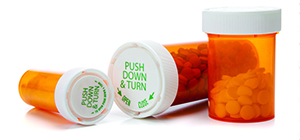Most people have taken at least one antibiotic in their lifetime. A common
reason can be strep throat. Antibiotics are medicines that fight infections
caused by bacteria; they work by targeting and killing harmful bacteria.
Normally, your immune system helps control the bacteria you have. But,
sometimes bacteria grow so quickly that your immune system can’t
keep up and then you may develop an infection that needs to be treated.
For example, a urinary tract infection (UTI) is an infection involving
any part of the urinary system, including urethra, bladder, and kidney.
If you are experiencing symptoms of an infection and bacteria are found,
you will typically be prescribed an antibiotic. If you do not have any
symptoms, but your urine sample shows some bacteria, it may be better
to wait and drink extra water or other beverages. Nurses may check on
you and ask you to drink more for a few days. Antibiotics do not help
when there are no UTI symptoms.

There are many different kinds of respiratory tract infections, such as
colds and coughs, the flu, pneumonia, and bronchitis. Not all respiratory
tract infections need to be treated with an antibiotic.
Doctors often use antibiotics to treat some lower respiratory tract infections
like pneumonia and bronchitis. The most common symptoms of a respiratory
infection needing an antibiotic are a fever with a bad cough. A cough
alone is typically not treated with an antibiotic.
If you are only experiencing a cough, it is often better to wait. Your
doctor will request that nurses check on you often to see how you are
feeling, take your temperature, and ask if you are experiencing any other
symptoms. They may give you acetaminophen (Tylenol) and/or a cough suppressant
to make you feel better. They may also ask you to drink more fluids and
raise your head with pillows. Nurses may check on you more and provide
acetaminophen for a few days.
Antibiotics are not effective with an infection caused by a virus; such
as a cold, bronchitis, the flu, most types of diarrhea or other medical
problems such as anemia. Antibiotics may not be the best or advised treatment
when someone is near the
end of life.
Antibiotics normally work by killing bacteria. Sometimes not all of the
germs are killed, and the strongest ones can grow and spread. A person
can get sick again, and this time the germs are harder to kill because
the antibiotics no longer work. This is called resistance and makes some
infections very hard to control. Resistance can make you sick longer,
requiring more doctor visits and drugs that are even stronger. The more
often you use an antibiotic, the greater the chance that the germs will
become resistant.
Taking antibiotics when you don’t need them is like leaving the lights
on all the time; the lights may burn out, leaving you in the dark when
you most need them. Using antibiotics when they are not needed can cause
them to not work when you are sick.
Antibiotics can save lives, but they can cause problems, too. Older people
have more side effects, which can cause problems all over the body. In
addition to resistance, antibiotics can cause nausea, dizziness, diarrhea,
rash, kidney damage, allergic reactions and even an infection called Clostridium
difficile or C.diff. Don’t take antibiotics for granted; don’t
take antibiotics for a virus and don’t ask for an antibiotic when
the provider says it is not needed.
Jonni Belden, RN, is the Vice President of Home Care Services for Campbell
County Health.
Source:
Agency for Healthcare Research and Quality